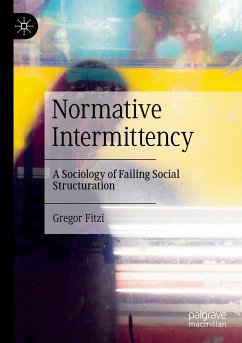This book addresses the manifold crisis of current societies and understands it as a failure of normative social structuration. As an exemplar for this development, it analyses the decline of welfare state models and the corresponding societal compromise. Yet, it evaluates them as a symptom of a wider malaise of normative orders in complex societies. The question thus arises as to how social science can study the ongoing societal transformation. The book frames the phenomenon as 'normative intermittency' to capture its fluid alternation of social structuration and destructuration and develops its analysis in three steps: first, it draws a theoretically reflected symptomatic of its occurrences; it then establishes the sociological diagnosis necessary to understand its unfolding and finally evaluates its political outcomes. Methodologically, the book advocates a complete overhaul of the analytical frames of sociology to gauge the intermittent rhythm of the ongoing societal transformation. Thus, it develops an innovative reading of classical sociological theory beyond a number of unreflected axiomatic assumptions of the current sociological mainstream. Thanks to the assessment of the political outcomes of failing social structuration the book turns to a discussion of the development of possible emancipation paths in the form of 'transformative social action'; reflexively, this accounts for the results of the sociological diagnosis of the crisis of normative social orders. The main analyses within the book scrutinise a number of empirical phenomena that establish normative intermittency in current societies and refer to the major debates that are taking place on the related topics in the state of art of sociological and political theory.
Bitte wählen Sie Ihr Anliegen aus.
Rechnungen
Retourenschein anfordern
Bestellstatus
Storno








